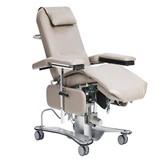The "No Advertising Please" campaign was launched at the annual conference of the Royal Australian College of General Practitioners in Adelaide on Saturday, October 11.
As part of the campaign, doctors signed a pledge declining to see for a year visiting drug company representatives who routinely call on many medical practices, providing a light lunch in exchange for the opportunity to promote their company's products to the doctors.
In the lead up to the launch, more than 50 doctors from across Australia had already signed the pledge.
More prescriptions for promoted drugs
The NAP group sponsoring the campaign cites research studies which have found that doctors receiving information from pharmaceutical companies – including from drug rep visits – is associated with increases in prescriptions of promoted drugs, decreased quality of prescribing and increased costs.
They also cite research that drug reps make inaccurate claims favourable to their drug, but made accurate and non-favourable claims about their competitors' drugs. Most doctors could not recall any false statements from these interactions.
In a study of Australian GPs from 2010, only around half of presentations from sales representatives included information about side effects, drug interactions and contraindications.
Similarly in a 2013 study in France, Canada and the US, harms were mentioned in fewer than half of encounters with pharmaceutical sales representatives, and this included drugs with known serious side effects and black box warnings.
'Discouraging' not demonising drug firms
NAP spokesperson, Brisbane GP Dr Justin Coleman, said the campaign was not seeking to demonise pharmaceutical companies, but rather to "discourage the routine acceptance by doctors of the promotion of drugs in this way".
"The associated perks may be minor but the research shows such marketing tends to raise the risk of patients getting inappropriate medicines," Dr Coleman said.
"That is an unacceptable state of affairs which erodes patient trust in their doctor.
"Many of our colleagues will say they are not unduly influenced by drug company reps, but the research shows that those who see reps often are more likely to prescribe their products, and likely to prescribe more inappropriately.
"Doctors are all vulnerable to being misled by skilfully-presented information while there are better, independent sources of information about drugs, such as Australia's NPS MedicineWise and the Australian Medicines Handbook."
Consumers Health Forum of Australia CEO Adam Stankevicius welcomed the campaign as "an important sign that doctors' prescribing decisions are based on best independent evidence".
"The NAP campaign brings a new and refreshing level of transparency into medical practice," he said.
"It can only boost the level of trust patients place in their doctors to see a NAP poster in their waiting rooms."
Examples of misleading promotion of medicines marketed in Australia:
Vioxx: aggressive and misleading promotion played down the risk of heart attacks of pain drug Vioxx (rofecoxib) and the manufacturer ultimately paid a fine of almost US$1 billion in the US, including for offences related to illegal marketing of the drug
Pradaxa: A BMJ investigation recently reported that important safety information was not publicly available about the aggressively marketed anti-coagulant for stroke prevention, Pradaxa (dabigatran); the manufacturer also recently settled litigation in the United States, for US$650 million, relating to allegations the drug caused serious and sometimes fatal bleeding
Avandia: Its manufacturer faced a record US$3 billion fine in 2012, in part because it failed to report safety data about its heavily promoted type 2 diabetes drug Avandia (rosiglitazone) which was linked to heart problems
Tamiflu: Following several years of campaigning, researchers finally succeeded in obtaining internal company data on the popular flu drug Tamiflu (oseltamivir): evidence showed modest benefits, and risk of side effects, and led researchers to question whether the drug should be stockpiled to fight pandemics




